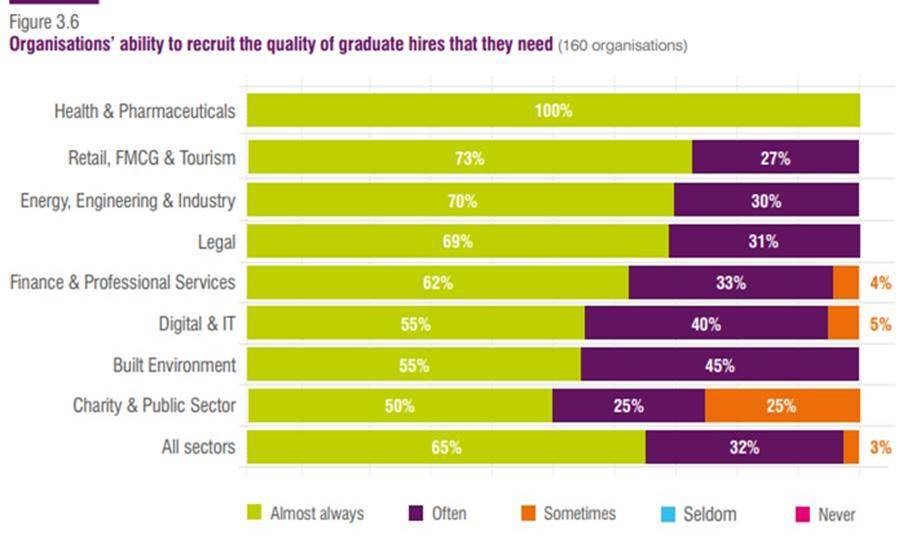I have drawn info provided by ISE, IES, REC, CIPD, Prospects and also canvassed some of GRBs recruitment experts for an explanation which I hope gives you a balanced view that may shed light on your situation.
1. War for talent.
It's super competitive. According to the ISE survey Nov 2021, recruitment for all types of student hires increased by 12% in 2020/21 and is expected to increase by 19% in 2021. To add to that, here are quotes from GRB recruitment experts at the front-line supplying graduates to recruiters.
“In tech everyone’s really struggling for numbers as it’s so competitive since the industry has bounced back after covid – grads are being snapped up very quickly.”
“10 x more employers are fishing in the same pool, at a time when typically, graduate applications tend to be lower (Sept onwards).”
“Personally, I would say lower applications is due to more companies actually hiring rather than grads staying at uni.”
“Postgraduate study was a thing in 2020 as there were so few jobs about that many just decided to do an MSc to avoid job hunting in the pandemic. I can’t say I’ve noticed it being as much of a thing this year and seems to be in line with pre-pandemic.”
2. Candidate shortages.
If you are after the best of the best graduates then you will quickly find that they are thin on the ground. Here's a few reasons why.
There has been a 20% increase in postgraduate students. A recent survey of more than 2,000 students by advice service Prospects showed that over a third of university finalists are changing their career plans due to the pandemic, while two-thirds who are planning postgraduate study are choosing to do so to switch career path. In addition, Tony Wilson, director of the Institute for Employment Studies (IES), said: “We’ve never seen jobs being filled at a faster rate than now . . . yet despite this we’re seeing labour shortages across all parts of the economy and a tighter jobs market than at any time in the last 50 years.” Gerwyn Davies at the Chartered Institute of Personnel and Development (CIPD), warned that with the supply of EU and older workers “at best plateauing”, rising inflation “could combine with recruitment difficulties to devastating effect”.
“Labour supply just cannot keep up with labour demand, and the problem appears to be getting worse,” said Tony Wilson, director of the IES, adding that inactivity in the UK seemed to be increasingly driven by ill health and early retirement. Whilst, Neil Carberry, chief executive of the UK’s Recruitment & Employment Confederation (REC), thinks the upheaval will soon ease, but that the UK will see both a steady outflow of EU nationals and a much bigger, lasting hit to labour supply as the baby boomer generation reaches retirement. He adds: “The immediate crisis will pass, but we are looking at a decade of a tighter labour market.”
3. Sector challenges.
Graduates perception of an industry plays a big part on whether they wish to work for you or not. The ISE Survey Nov 2021 showed that certain sectors were struggling with applications.

4. Candidate self-doubt and low confidence.
GRB recently attended the ISE Diversity & Inclusion Conference and whilst the number of graduate roles available is the same, graduates are less confident in their prospects which could be due to the reduced opportunities for work experience/internships/placements during covid over the past two years. The upcoming cohort have had less opportunities to bridge the gap between university and graduate work which could be putting off a large proportion of students from applying as they feel less ready to enter the workforce than previous cohorts. It will be interesting to see how diversity stats are looking for applications this year compared to 2019 as confidence is particularly low amongst those from lower socioeconomic or minority ethnic backgrounds.
What has been YOUR experience? Do share with me at [email protected].




